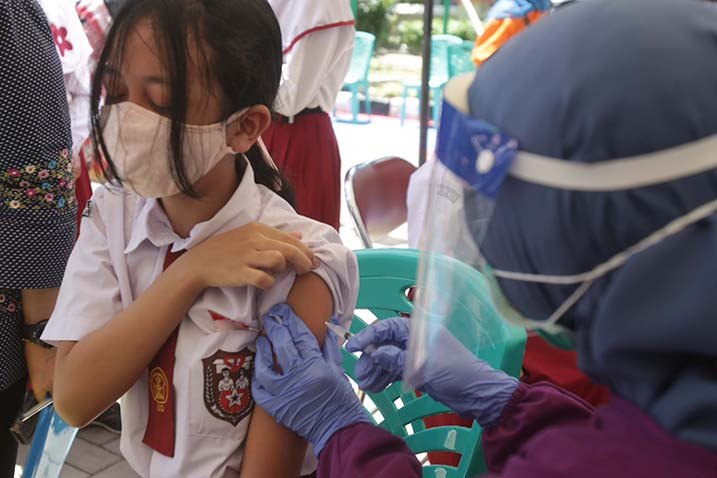Popular Reads
Top Results
Can't find what you're looking for?
View all search resultsPopular Reads
Top Results
Can't find what you're looking for?
View all search resultsLet’s get childhood immunization back on track
Immunization against common childhood diseases is the most effective public health intervention to prevent outbreaks.
Change text size
Gift Premium Articles
to Anyone
A
round the world, countries are racing at an unprecedented speed to develop a safe and effective vaccine against COVID-19. While such a breakthrough could allow social restrictions to be safely eased and bring an eventual end to the pandemic, it will likely take months or years to achieve.
In the meantime, we cannot overlook the vaccines that we already have to avert additional waves of childhood illness and death from other deadly, yet entirely preventable diseases such as measles and polio.
Already there is evidence that routine immunization services are at risk. A recent assessment of the Indonesian health system conducted by the Ministry of Health and United Nations Children’s Fund (UNICEF) shows that 84 percent of the more than 5,000 health facilities surveyed from all 34 provinces reported significant disruptions to immunization services. Although many continue to offer immunization, others have had their services partially interrupted or shut down completely.
The survey outlines several reasons for these suspensions, including the introduction of physical distancing measures, disruptions to vaccine supplies caused by travel restrictions and hesitancy on the part of caregivers to bring their children to health facilities.
A follow-up survey by the Ministry of Health and UNICEF from July 2020 with nearly 7,000 parents and caregivers provides an understanding of community views on immunization during the pandemic. Despite widespread fears of becoming infected with the virus, respondents expressed strong support for the government’s policy to continue immunization services with safety precautions. The majority of parents and caregivers indicated that despite the pandemic, they would like to continue safely immunizing their children. This shows there is still strong demand for vaccination services – and for good reason.
The science is clear: immunization saves lives. Immunization against common childhood diseases is the most effective public health intervention to prevent outbreaks. Routine childhood immunization requires fewer resources than responding to outbreaks and preventing illnesses helps to reduce the burden on already strained health systems. It is also a sound investment: globally every US dollar spent on childhood immunizations can yield up to US$44 in economic benefits, which include savings on medical costs and productivity loss when a child is sick and a parent cannot work.
In Indonesia, the immunization program has accomplished major public health goals, such as the eradication of maternal and neonatal tetanus in 2016. The proportion of children receiving all their basic routine vaccines has increased from 59 percent in 2007 to 65 percent in 2017, contributing to a drop in under-five child mortality, from 44 deaths per 1,000 live births to 32 during that same time period.
In the face of a global pandemic, hard-fought gains in immunization coverage are in peril. Data from the Ministry of Health already shows a steep drop in the number of child vaccinations this year.
Between March and May 2020, the coverage rates of life-saving vaccines decreased by more than 35 percent compared to the same period in the previous year.
If we do not reverse this trend immediately, the consequences of this declining immunization coverage will be devastating. Decades of progress in child survival and development could now come to a standstill – or even be reversed. Diseases once thought to be eliminated in Indonesia could resurge, putting strains on the health system.
UNICEF and the World Health Organization have maintained that immunization can be delivered safely during the COVID-19 pandemic.
With this in mind urgent action is needed to resume childhood vaccination services across the country, and to ensure health facilities are sufficiently staffed by workers equipped with adequate personal protective equipment to lower the risk of virus transmission. To regain trust in the health system – which is pivotal to any immunization effort – outreach to communities must also be made a priority.
But above all, investment in immunization must be increased and safeguarded against any potential cuts.
For the well-being of our children, we cannot let efforts against a new disease come at the expense of long-term progress against others. One deadly outbreak cannot be exchanged for another.
If anything, COVID-19 has revealed what is at stake when communities do not have the protective shield of immunization against an infectious disease. While there is no vaccine available for COVID-19 yet, there are vaccines for critical childhood diseases like diphtheria, measles and polio. We must ensure that these lifesaving services continue to reach all children across the country, especially those in lower income households and those living in rural areas.
When it comes to immunization, no child is safe until every child is safe.
***
The writer is UNICEF representative in Indonesia.










